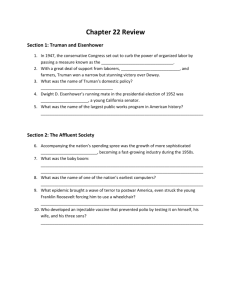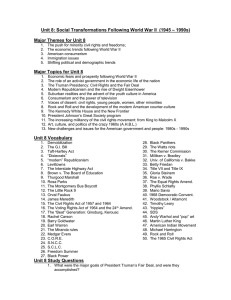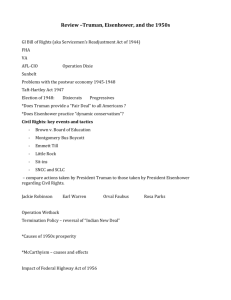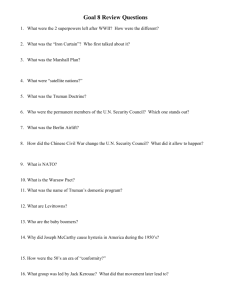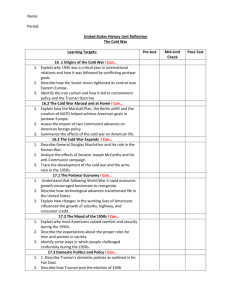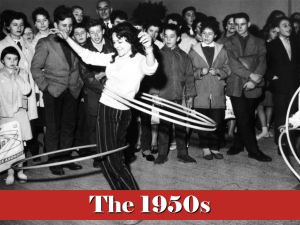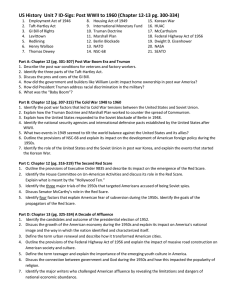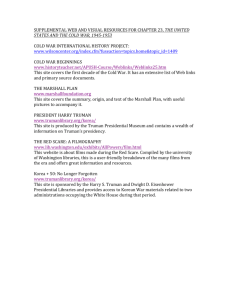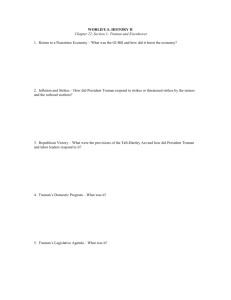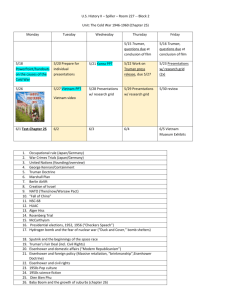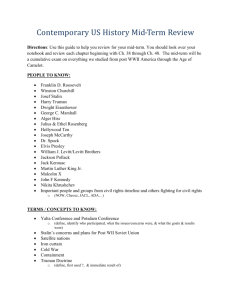Review for Test 1
advertisement
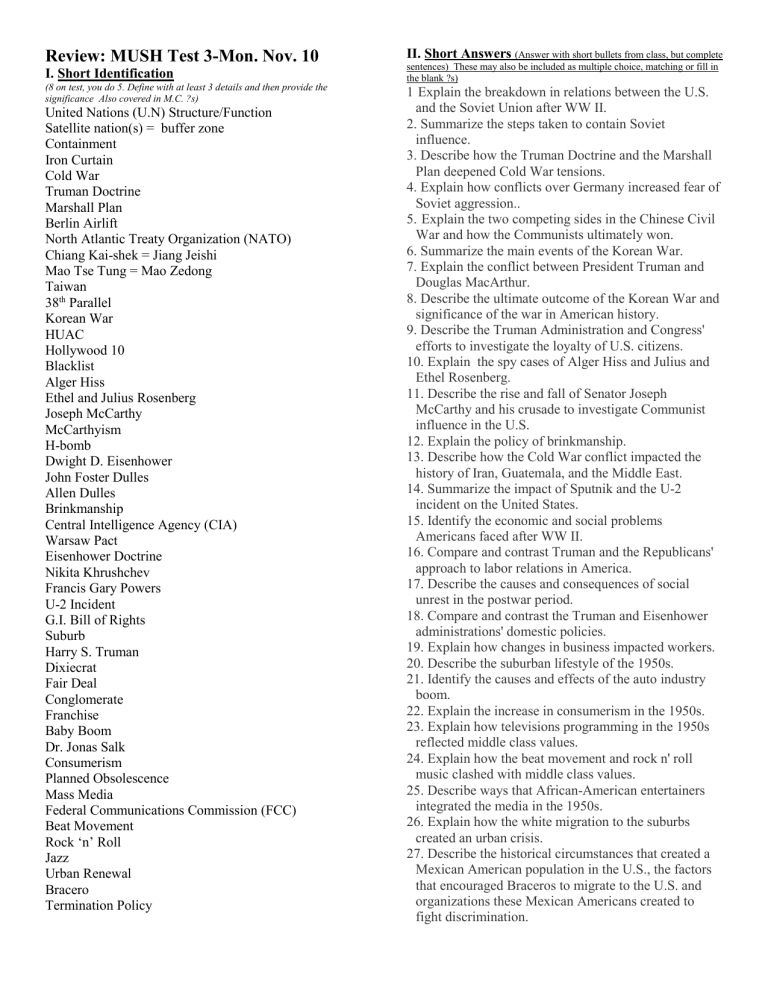
Review: MUSH Test 3-Mon. Nov. 10 I. Short Identification (8 on test, you do 5. Define with at least 3 details and then provide the significance Also covered in M.C. ?s) United Nations (U.N) Structure/Function Satellite nation(s) = buffer zone Containment Iron Curtain Cold War Truman Doctrine Marshall Plan Berlin Airlift North Atlantic Treaty Organization (NATO) Chiang Kai-shek = Jiang Jeishi Mao Tse Tung = Mao Zedong Taiwan 38th Parallel Korean War HUAC Hollywood 10 Blacklist Alger Hiss Ethel and Julius Rosenberg Joseph McCarthy McCarthyism H-bomb Dwight D. Eisenhower John Foster Dulles Allen Dulles Brinkmanship Central Intelligence Agency (CIA) Warsaw Pact Eisenhower Doctrine Nikita Khrushchev Francis Gary Powers U-2 Incident G.I. Bill of Rights Suburb Harry S. Truman Dixiecrat Fair Deal Conglomerate Franchise Baby Boom Dr. Jonas Salk Consumerism Planned Obsolescence Mass Media Federal Communications Commission (FCC) Beat Movement Rock ‘n’ Roll Jazz Urban Renewal Bracero Termination Policy II. Short Answers (Answer with short bullets from class, but complete sentences) These may also be included as multiple choice, matching or fill in the blank ?s) 1 Explain the breakdown in relations between the U.S. and the Soviet Union after WW II. 2. Summarize the steps taken to contain Soviet influence. 3. Describe how the Truman Doctrine and the Marshall Plan deepened Cold War tensions. 4. Explain how conflicts over Germany increased fear of Soviet aggression.. 5. Explain the two competing sides in the Chinese Civil War and how the Communists ultimately won. 6. Summarize the main events of the Korean War. 7. Explain the conflict between President Truman and Douglas MacArthur. 8. Describe the ultimate outcome of the Korean War and significance of the war in American history. 9. Describe the Truman Administration and Congress' efforts to investigate the loyalty of U.S. citizens. 10. Explain the spy cases of Alger Hiss and Julius and Ethel Rosenberg. 11. Describe the rise and fall of Senator Joseph McCarthy and his crusade to investigate Communist influence in the U.S. 12. Explain the policy of brinkmanship. 13. Describe how the Cold War conflict impacted the history of Iran, Guatemala, and the Middle East. 14. Summarize the impact of Sputnik and the U-2 incident on the United States. 15. Identify the economic and social problems Americans faced after WW II. 16. Compare and contrast Truman and the Republicans' approach to labor relations in America. 17. Describe the causes and consequences of social unrest in the postwar period. 18. Compare and contrast the Truman and Eisenhower administrations' domestic policies. 19. Explain how changes in business impacted workers. 20. Describe the suburban lifestyle of the 1950s. 21. Identify the causes and effects of the auto industry boom. 22. Explain the increase in consumerism in the 1950s. 23. Explain how televisions programming in the 1950s reflected middle class values. 24. Explain how the beat movement and rock n' roll music clashed with middle class values. 25. Describe ways that African-American entertainers integrated the media in the 1950s. 26. Explain how the white migration to the suburbs created an urban crisis. 27. Describe the historical circumstances that created a Mexican American population in the U.S., the factors that encouraged Braceros to migrate to the U.S. and organizations these Mexican Americans created to fight discrimination. 28. Describe the stages and consequences of America’s evolving Native American Indian policies. III. Essays (Two will be on the test, you will write on one of the two. Prepare simple outlines for 3. For our party write a five paragraph essay with a proper intro, thesis, body paragraphs with topic sentences, claims and evidence, conclusions are optional but helpful) 1. Discuss the origins of the Cold War and analyze at least four historical examples involving the Truman Administration’s response to the Communist threat. 2. Discuss America’s second communist scare by analyzing the evidence of a communist conspiracy, the effectiveness of the American government’s responses (two branches), and the long term consequences of the Second Red Scare. 3. Was the conformity of the 1950s ultimately a positive or negative development in U.S. history? Support your claim with detailed evidence from five of the following events/ideas (Cold War, Women’s roles, Native American Indian policy, Movie Censors, Space Race, Korea, Planned Obsolescence, Franchises, Mexican Americans’ experience, Consumerism, Company men, Television, Suburbs, Red Scare) 4. Analyze in detail both African American culture’s influence on the origins and evolution of rock ‘n’ roll AND the key pioneers of this new musical style.
